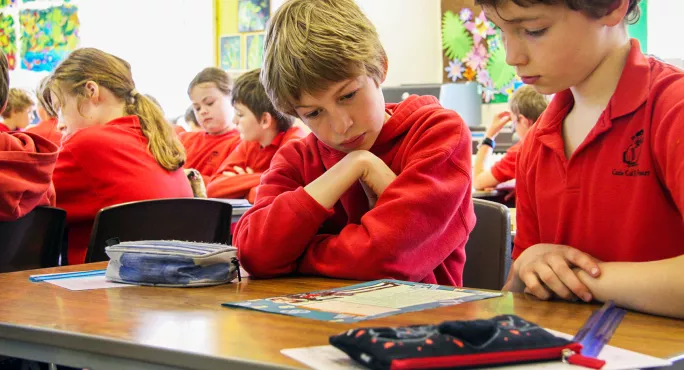
- Home
- News
- Specialist Sector
- Revealed: MinistersŌĆÖ ŌĆśstaggeringŌĆÖ absence from SEND schools
Revealed: MinistersŌĆÖ ŌĆśstaggeringŌĆÖ absence from SEND schools

The minister tasked with reforming special educational needs and disabilities (SEND) visited no special schools for at least four months after the general election, according to government data obtained by Tes.
Just one special school received a Department for Education ministerial visit during that period, the figures show.
The findings come as the buckling SEND system is widely seen as being at crisis point, and as the DfE faces criticism for lacking a ŌĆ£sense of urgencyŌĆØ in its response.
They also follow concern that specialist sector expertise is being overlooked in plans to reform the SEND system.
Warren Carratt, CEO of Nexus Multi-Academy Trust, which runs 17 schools - mainly special academies - said it was ŌĆ£staggeringŌĆØ that ministers had not made more effort to ŌĆ£see the reality of frontline specialist positionŌĆØ, especially ŌĆ£given the government knew how urgent the SEND crisis was before they took officeŌĆØ.
He added: ŌĆ£It feels depressingly like the governmentŌĆÖs commitment to ŌĆśwork with the sector, for the sectorŌĆÖ is a refrain that isnŌĆÖt being applied to our state special schools.ŌĆØ
Mr Carratt also expressed concern about the language used to describe the SEND system, saying it was sometimes ŌĆ£really quite insulting to the amazing work special schools do, and ignores the high levels of satisfaction our families haveŌĆØ.
Former education secretary Gillian Keegan described the SEND system as being in a ŌĆ£lose-lose-loseŌĆØ situation, while LabourŌĆÖs schools minister Catherine McKinnell, who is responsible for SEND, said the current system ŌĆØŌĆØ.
- News: ŌĆśNo urgencyŌĆÖ in DfE to tackle SEND ŌĆśemergencyŌĆÖ, MPs warn
- Background: Are special schools being left out of the mainstream inclusion push?
- SEND: Crisis ŌĆświll spiral out of controlŌĆÖ, MPs warn
The period covered by TesŌĆÖ freedom of information (FOI) request to the DfE runs from the general election on 4 July 2024 to 11 November 2024.
Simon Knight, joint headteacher at Frank Wise School in Oxfordshire, a special school for 2- to 19-year-olds, said: ŌĆØGiven that children with SEND are one of the key priorities for the government, and that the specialist sectorŌĆÖs sole purpose is to educate children with SEND, it might be of value for ministers to make a point of prioritising coming to see what it is that we do.ŌĆØ
The FOI response listed 35 DfE ministerial visits to 34 separate schools, consisting of 23 primaries, nine secondaries, a sixth-form college and a special school.
This was Sunningdale School in Sunderland for children with severe learning difficulties, which was visited by early years minister┬ĀStephen Morgan according to the list provided by the DfE.
The DfE did not highlight any other, or subsequent, visits to special schools when approached by Tes for this article, although education secretary Bridget Phillipson posted on social media platform X about visiting Sunningdale in September.
Ministers did visit some schools with specialist resource provision, such as Regent Farm First School in Newcastle, which supports pupils with visual impairments.
On 15 November, Ms McKinnell about visiting an alternative provision site and, separately, Waterville Primary School in North Shields, which is mainstream with some resourced speech, language and communication provision.
A previous Tes investigation revealed that rising numbers of pupils are using both formal and informal additional provision, as Labour signals it wants more children to be educated in mainstream settings.
Mr Knight said there was still value in seeing how special schools work, as ŌĆ£much of what we do could also have value for children with SEND in mainstream settings, tooŌĆØ.┬Ā
No visits to Yorkshire and South West
Mr Morgan visited the highest number of schools - 18 - during the four-month period, followed by education secretary Bridget Phillipson at nine and Ms McKinnell at eight.
One of the schools - Mount Pleasant Primary School in Darlington - was visited by Ms Phillipson and Ms McKinnell on the same day.
The North East - where Ms Phillipson and Ms McKinnellŌĆÖs constituencies are based - received the most school visits (nine), followed by London (seven), the North West (six) and the South East (five).
Schools in Yorkshire and the South West received no visits by ministers, according to the data.
┤Ī╠²Tes investigation previously revealed that, under the previous Conservative administration, ministers were more likely to visit schools in Spain and France than those in the South West.
London schools dominated the list of Conservative visits, which was criticised at the time by leaders in the North of England, and attributed by a former DfE official to long travel times and packed ministerial diaries.
Schools visited by Labour ministers
All 34 schools visited by Labour ministers from July to November were rated either ŌĆ£goodŌĆØ or ŌĆ£outstandingŌĆØ by Ofsted, and their average proportion of pupils on free school meals was 34.5 per cent - higher than the national average of 24.6 per cent.
Of those schools that listed a religious character, five were Christian or Church of England, four were Roman Catholic, two were Jewish and one was Muslim.
Six were local-authority-maintained schools, five were voluntary-aided and the remaining 23 were run by trusts.
The DfE has been contacted for comment.
For the latest education news and analysis delivered every weekday morning, sign up for the Tes Daily newsletter
You need a Tes subscription to read this article
Subscribe now to read this article and get other subscriber-only content:
- Unlimited access to all Tes magazine content
- Exclusive subscriber-only stories
- Award-winning email newsletters
- Unlimited access to all Tes magazine content
- Exclusive subscriber-only stories
- Award-winning email newsletters
You need a subscription to read this article
Subscribe now to read this article and get other subscriber-only content, including:
- Unlimited access to all Tes magazine content
- Exclusive subscriber-only stories
- Award-winning email newsletters
- Unlimited access to all Tes magazine content
- Exclusive subscriber-only stories
- Award-winning email newsletters



